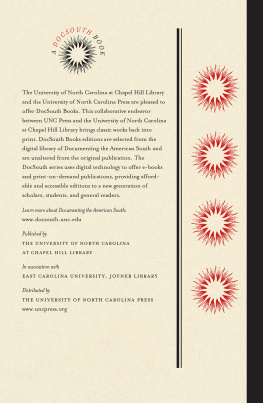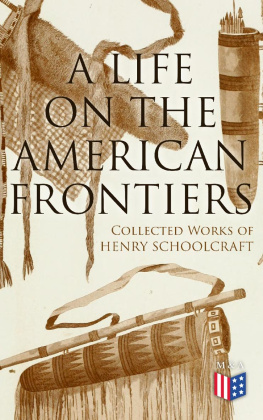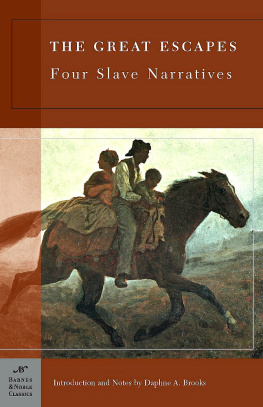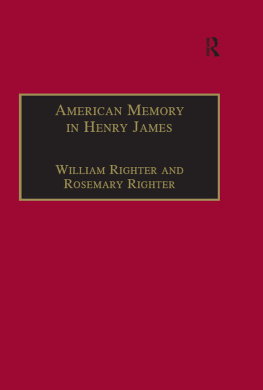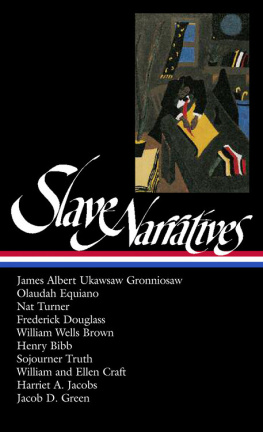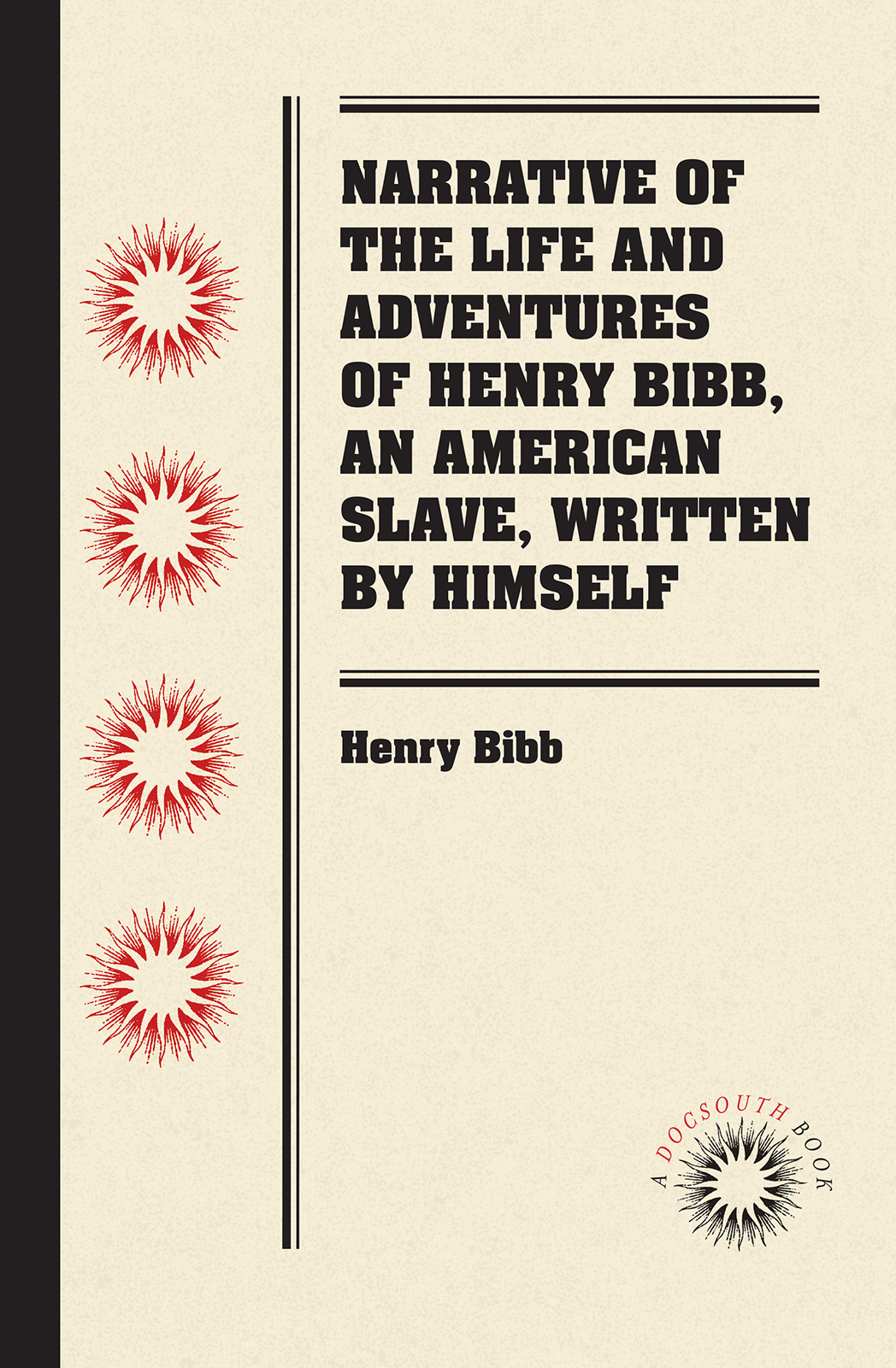This edition is made available under the imprint of DocSouth Books, a collaborative endeavor between the University of North Carolina at Chapel Hill Library and the University of North Carolina Press. Titles in DocSouth Books are drawn from the Librarys Documenting the American South (DocSouth) digital publishing program, online at docsouth.unc.edu. These print and downloadable e-book editions have been prepared from the DocSouth electronic editions.
Both DocSouth and DocSouth Books present the transcribed content of historic books as they were originally published. Grammar, punctuation, spelling, and typographical errors are therefore preserved from the original editions. DocSouth Books are not intended to be facsimile editions, however. Details of typography and page layout in the original works have not been preserved in the transcription.
DocSouth Books editions incorporate two pagination schemas. First, standard page numbers reflecting the pagination of this edition appear at the top of each page for easy reference. Second, page numbers in brackets within the text (e.g., [Page 9]) refer to the pagination of the original publication; online versions of the DocSouth works use this same original pagination. Page numbers shown in tables of contents and book indexes, when present, refer to the original works printed page numbers and therefore correspond to the page numbers in brackets.
Summary
Henry Bibb (1815-1854) was born in Shelby County, Kentucky. His father was state senator James Bibb, and his mother, Mildred Jackson, was an enslaved woman who worked for Willard Gatewood. Henry Bibb was married twice, once before his escape to a slave named Malinda, and again after his escape to a woman named Mary Miles. In 1842, Bibb began lecturing on slavery and became a well-known African American activist. In 1849 he published his autobiography, Narrative of the Life and Adventures of Henry Bibb, An American Slave. Bibb helped create Canadas first black newspaper, Voice of the Fugitive, a publication that worked to convince African slaves to settle in Canada. He was the founding director also of a Canadian black colonization project, the Refugee Home Society.
Lucius C. Matlack, author of the introduction to Bibbs Narrative, was born on April 28th, 1816, in Baltimore. A preacher in the Union Church in Philadelphia, he was recommended to join the Philadelphia Annual Conference, but because of his abolitionist beliefs, his application was rejected. Matlack continued to preach after losing his preaching license in 1839. He eventually helped organize the Wesleyan Methodist Connection. During the Civil War, he served as an army chaplain. In 1867 the Philadelphia Annual Conference invited him back, and he spent the rest of his recorded life preaching throughout the eastern United States.
Bibb begins his narrative with his 1815 birth to a slave woman named Mildred Jackson, the mother of six other boys after Henry. Though he never knew his father, Bibb was told that he was the son of a white man named James Bibb. Henry and the rest of his family were the legal property of a slaveholder named David White, a widower with a little girl around the same age as Henry. While she was being schooled, Henry was loaned out to labor on neighboring farms; his wages were used to pay for her schooling.
As a young teenager, Bibb was sold to a man in Newcastle, Kentucky, named Mr. Vires, whose wife treated Bibb poorly. Recalling abuses in that household, Bibb says that the Vires cruelty drove him to escape. He would run away for days at a time, and though they would beat him for it, he never gave up. Tired of his escapes, they the Vires returned him to Mr. White, who was remarried to a woman Bibb describes as a tyrant (p. 16). When Mr. White began to hire him out again, Bibb resumed his escape attempts.
In 1833, at the age of eighteen, Bibb was introduced to his future wife, Malinda, an enslaved woman who lived on farm four miles from Bibb. Initially reluctant to get romantically involved with her because he knew that such a relationship would impede his aspirations to freedom, the more he spent time with her, the more he was distracted from his goals. Though everyone except for Malindas owner opposed their union, they entered into a common-law marriage since legally binding marriages were a privilege withheld from slaves by most slaveholders. After marrying Malinda, Bibb was moved from farm to farm until, because of fear that he would run away to see his wife, he was contracted to labor for the Malindas slaveholder. He witnessed the abuse of his wife and their daughter, Frances, who was likewise abused.
In December of 1837, Bibb made another, more successful, bid for freedom. He left his wife and child without their knowledge and crossed the Ohio River into the free state of Indiana. From there he took a steamboat to Cincinnati, all the while hiding his identity from those onboard. In Cincinnati, he came into contact with the Underground Railroad and started on his journey to Canada. Along the way many people helped Bibb while others refused, but his greatest assistance came from a small community of African Americans, many of whom were themselves fugitive slaves. In Canada he found work and saved enough money for a return trip to Kentucky and his family.
Bibb met with his family in a joyous reunion and quickly made plans for their escape. He traveled to Cincinnati to await their arrival, but while he was there, two men professing to be abolitionists came and spoke to him, offering their help in his escape. But when these men obtained the name and address of his owner, they betrayed him, and a mob soon came to recapture him. They shipped Bibb downriver, offering him money to assist in the capture of other escaped slaves, but he refused. Bibb eventually learned that he was not in fact returning to his family but was to be sold further south. He escaped again from captors who were attempting to sell him in Louisville, Kentucky, and he headed back to Bedford to attempt to rescue his family once again. The guard placed on his family was so strict, however, that he was forced to abandon his attempt. He left instructions for his wife to meet him in Ohio as soon as the excitement about his escape had died down, and then took his leave up the river once again.
Again betrayed and captured and sent to a slave prison, Bibb was unexpectedly reunited with his wife and child there. He contrived to be sold with his family to a pious-looking man named Whitfield, who turned out to be a horribly abusive and neglectful slaveholder. They suffered many atrocities at his hands, including the loss of his second child, whose mortal illness was caused by neglect. Bibb escaped yet again only to be recaptured when he returned for his family. This cycle of escape, return, and recapture occurred a few more times before he found himself in the hands of a Native American slaveholder and separated from his family. His new owner was comparatively liberal and provided for his slaves, but before long he passed away and Henry made another break for Canada. He again attempted to find his wife, only to learn that she was living with another man, having given up hope for a reunion. Neither this event nor the many captivities he endured quelled his spirit entirely, and ultimately he found his freedom.

